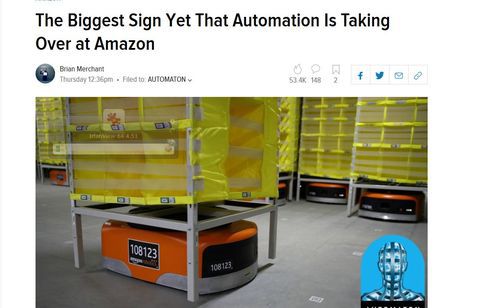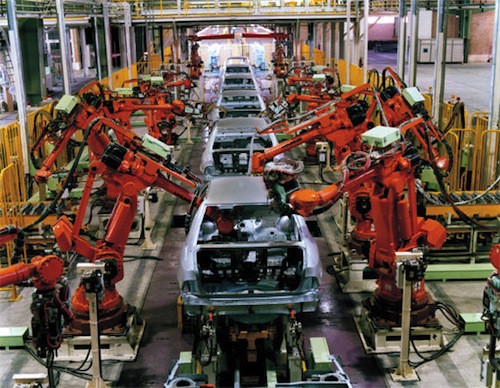
01/05/2019
Jeff Bezo’s incorporation of automation into online shopping has made Amazon the world leader in e-commerce by utilizing the technology of robots. His business acumen has also made him the richest man on earth, worth around $150 billion.

Now the holiday sales statistics are in, and the system is working well: there were more items ordered and shipped worldwide than ever before — with fewer human workers.
It has long been a talking point among businesses going big on automation that they were adding the machines to “help” human workers, not replace them. Of course it make no sense for a business to invest heavily in modern robotics just to make work easier for the humans — the long term plan is large scale replacement, such as has taken place in automotive manufacturing.
Below, humans have largely disappeared from some aspects of automotive manufacturing.

The jobs economy is booming now — thanks to Trump’s economic policies — but when machines become cheaper than human workers, replacement will happen. Amazon is a leading indicator of robotic trends, which we should watch closely.
Finally, it goes without saying that low-skilled immigrants are totally obsolete in the future automation economy.
The Biggest Sign Yet That Automation Is Taking Over at Amazon, By Brian Merchant, Gizmodo, January 3, 2019
The day after Christmas, Amazon celebrated its own annual holiday tradition: announcing record-breaking sales in a very long press release that affirms its status as the largest retailer in the known universe. As such, Jeff Bezos’s Big Store said that in 2018, it surpassed its own sales records with “More Items Ordered Worldwide Than Ever Before.” Of course, Amazon announces some version of that milestone just about every year, as it continues to upend brick-and-mortar stores and march into new digital markets around the globe.
What is notable, though, is that this time, Amazon hit its record with fewer seasonal employees than, yes, ever before. As Alison Griswold reported in Quartz at the beginning of the holiday hiring season, Amazon brought on 20,000 fewer part-time workers than in 2017 or 2016. And it still managed to moved more products than any time in its history. More items shipping, fewer people shipping them — the equation’s pretty clear. Amazon’s embrace of automation is beginning to show itself, and it’s beginning to bear fruit for Bezos and co.
Amazon bought Kiva Systems, a company that built warehouse robots, back in 2012, and has long been integrating automation into its supply chain. It is experimenting with autonomous delivery vehicles. Last year, Amazon expanded its cashier-less grocery store chain. And Amazon has pursued more fantastical autonomous visions, from its ever-ephemeral delivery drones to robot-proof worker cages employees might use to navigate a heavily autonomous environment. It even automates its top-tier white collar jobs.
But it’s only now that it looks like the company’s initiatives are poised to seriously impact hiring — the company had been expanding and growing at such a rapid clip (sometimes upwards of 40 percent revenue per quarter) and so had been hiring (especially in its fulfillment centers) like crazy too. There was room for both, and Amazon, ever sensitive to claims that it is automating jobs away, stressed that its robotics augmented work, not eliminate it.
In September 2017, The New York Times ran a short documentary about Amazon’s palletizer robots, which the company claimed had not led to any job cuts. “Amazon has preserved job growth at its factories so far,” the Times wrote. “Whether it can continue to do so is a subject of debate.” A year later, the answer seems to be that it will not. With the company’s growth rates currently expected to slow and to settle in the 20-30 percent range, and its automation technology maturing, the smart money says we’ll see it chip into job availability.
“We’ve seen an acceleration in the use of robots within their fulfillment centers, and that has corresponded with fewer and fewer workers that they’re hiring around the holidays,” Citi analyst Mark May told CNBC last November. This was, he said, the “first time on record” that Amazon planned to hire fewer holiday workers than it did the previous year, in the company’s 20-year lifespan. (Continues)
This is a content archive of VDARE.com, which Letitia James forced off of the Internet using lawfare.